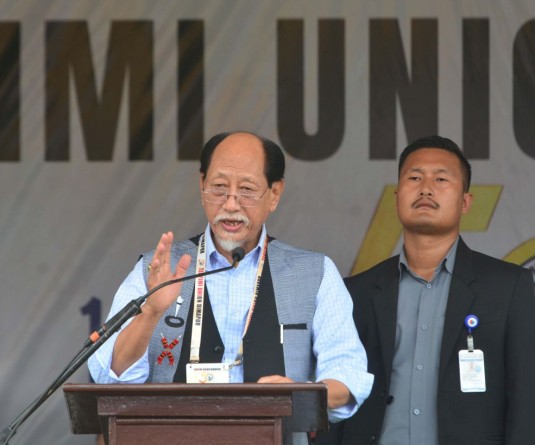
Monalisa Changkija’s book ‘Middles’ launched in Dimapur
Morung Express News
Dimapur | December 11
What should the role of writers be in a society?
The question became a fulcrum at today's Dimapur launch of writer, poet, journalist, Monalisa Changkija’s recently published book by Heritage Publishing House, “Middles.”
Writers should “write about the kind of society Nagas should have today and in the future,” said veteran Naga leader, Dr. SC Jamir, at the launch. Reiterating that the future is for writers to shape, he noted, “A people or a nation without a future will perish.”
Dr. Jamir remained frustrated with literature obsessing with the Naga past and appealed to writers to focus on “what kind of Nagaland we should have.”
Generational relay According to author, Monalisa Changkija, writing or any other cultural activity is “generational relay.”
“We are inspired to write because at a very primal level there is this urge and the urgency to tell our stories and of those around us; thereby we subconsciously continue the literary generational relay of not only story-telling but also of bringing to the cognizance of our generation and the ones that would follow about the many dimensions of the realities of our lives ~ thereby recording the several histories that happen simultaneously in any community, any society,” the author noted while explaining how her book came to be.
But all the traits of a “good writer,” as suggested by Fr. Dr. AJ Sebastian, Professor (Rtd) of Nagaland University,—love of writing, good structure of language, observation skills, self motivation, professionalism, all that Monalisa Changkija has—are not enough, in Changkija’s opinion, particularly in a “community-bound and community-bonded tribal society” to “take this generational relay forward.”
“Nagaland needs policies and affirmative action that would prioritize our people’s innate potentials to create a larger imprint on our lives and future rather than the transient that have been allowed to dictate the course of our lives and future,” asserted Changkija.
With or without the policies, Changkija takes the relay forward. She “moves from the macro identity to the micro identity and touches all groups of people in society,” observed Fr. Dr. CP Anto, Principal of NEISSR, while launching the book that was released at the Hornbill Festival on December 3.
“She delights and instructs the reader at the same time,” remarked Fr. AJ Sebastian. According to Dr. S Elika Assumi, Assistant Professor, the author brings “witty enquiry into the indigestible truth.”
“The book inspires us to change and bring change in the lives of our family, community and society,” Fr. Anto said at the launch organized by Wordsmithereens, the Nagaland chapter of the North East Writers’ Forum.
Shattered dreams Unburdening his heart at the book launch, the former Chief Minister of Nagaland as well as ex Governor of several states across the Indian Union, Dr. SC Jamir, explained how veterans like him find their dreams for Nagaland “completely shattered.”
“Nagaland appears to be mortally wounded. Naga society is in the ICU. The entire system has collapsed and the hallmark of Naga society is moral bankruptcy,” lamented the leader.
When Nagaland State was formed—Dr. Jamir is the only surviving signatory to the 16-points agreement between the Government of India and Naga People’s Convention—“our dream was that Nagaland should be equal with the rest of the country if not more,” he said. “The dynamism and hard working nature of the Nagas was recognized not just by the white people but people at large.” But today, “Nagas are totally confused. Leaders don’t know where they are leading the people and the people are numb,” Dr. Jamir maintained. “There is no discipline in bureaucracy and no respect for governance.” According to him, “Nagas have become blinded and deafened by materialism. Money is destroying us as a people. Therefore, we cannot see what is in place and cannot hear what others are saying. We don’t listen to counsel by churches, intellectuals or writers. We have lost the morality to control our lives and our society.”
In this context, Dr. Jamir set the question, “what should the role of writers and youth be in society?” He laid out the choice before the Naga people—to live in the past or to live in the present and design the future. Writers, he concluded, have the responsibility to disseminate these ideas. For him, “Only then we can say we have roots.”





